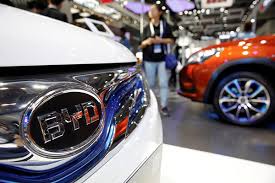Morgan Stanley believes BYD Company, with its newly launched charging system, has taken electric vehicle development to a critical turning point and that advancements in autonomous driving and charging technology are the two key factors in overcoming bottlenecks in the electric vehicle (EV) market.
BYD’s 1000kW Charging System Draws Market Attention
Morgan Stanley has released a report analyzing BYD’s newly launched 1000kW charging system, which can provide 400 kilometers of driving range in just five minutes. The bank believes that BYD’s new system is a significant marketing move to reinforce its leadership in battery and charging performance, addressing consumer concerns about range and charging convenience.
While advancements in autonomous driving will differentiate EVs from traditional gasoline cars, charging technology breakthroughs will make energy replenishment more comparable to refueling conventional vehicles, it emphasizes.
The bank expects China’s NEV penetration rate to reach approximately 50% this year and accelerate from 2027 onward, reaching 75% by 2030.
Uncertainties Remain, Morgan Stanley Maintains ‘Equal-Weight’ Rating
According to BYD’s launch event, the new 1000kW charging system will first be available for its high-end models, such as the Han L and Tang L, with deliveries expected to begin in April.
Morgan Stanley acknowledges that pricing remains a critical factor in consumer purchasing decisions, and BYD’s pre-sale price of 270,000 yuan (about $37,000) appears conservative, but the official price announcement in April could be significantly lower, intensifying competition with mid-size sedans priced between 200,000 yuan and 250,000 yuan
However, the bank highlights several unresolved questions:
- How long will it take to deploy this technology across the more than 4,000 suitable charging stations?
- What is the impact on battery lifespan?
- How does the cost compare to existing 800V platforms that offer 600 kilometers of range in 10 minutes with 5C charging?
Morgan Stanley maintains an “Equal-Weight” rating on BYD, citing the following key factors:
Upside Risks: Faster-than-expected overseas expansion, stronger-than-expected demand for NEVs, and higher-than-expected contributions from BYD’s consumer electronics business.
Downside Risks: Challenges in overseas expansion, weaker-than-expected NEV demand, and lower-than-expected profit margins.

